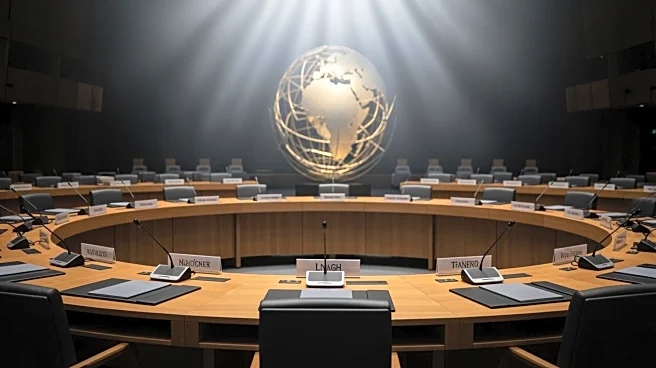What's Happening?
The Gaza Strip is facing severe weather conditions, with heavy rains flooding tent camps and makeshift shelters, worsening the humanitarian situation for displaced Palestinians. The Israeli body responsible for humanitarian aid reports that hundreds of
trucks carrying essential supplies enter Gaza daily. Meanwhile, the U.N. Security Council is set to vote on a U.S. proposal for an international stabilization force in Gaza, which faces opposition from Russia, China, and some Arab countries. The proposal aims to address the ongoing humanitarian crisis and facilitate peace negotiations, including Hamas' disarmament and the future governance of Gaza.
Why It's Important?
The humanitarian crisis in Gaza is exacerbated by the collapse of infrastructure due to Israeli strikes, leaving millions in need of emergency shelter and basic necessities. The U.S. proposal for a stabilization force is significant as it seeks to provide security and aid, potentially easing tensions and advancing peace talks. However, opposition from major international players like Russia and China could hinder progress. The situation impacts regional stability and international relations, with potential consequences for U.S. foreign policy and humanitarian efforts.
What's Next?
The U.N. Security Council's vote on the U.S. proposal is a critical next step. If approved, the stabilization force could help improve conditions in Gaza and support peace negotiations. However, continued opposition may lead to diplomatic challenges and require further negotiations. The humanitarian situation remains urgent, with immediate needs for shelter and sanitation. Stakeholders, including international organizations and governments, will need to collaborate to address these challenges and support the affected population.
Beyond the Headlines
The crisis in Gaza highlights broader issues of international diplomacy, humanitarian aid, and regional politics. The ethical implications of providing aid amidst political opposition and the long-term impact on Palestinian self-determination are significant. The situation may influence future U.S. foreign policy decisions and international relations, particularly with countries opposing the stabilization force. Additionally, the humanitarian crisis underscores the need for sustainable solutions to infrastructure and governance challenges in conflict zones.















